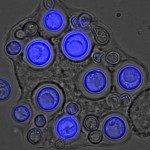Link to Pubmed [PMID] – 8816135
Clin. Infect. Dis. 1996 Jul;23(1):91-6
Differences between the two varieties of Cryptococcus neoformans with regard to geographic distribution, epidemiology, and even pathogenicity have been described. None between C. neoformans variety neoformans serotypes A and D have been reported. We reviewed 452 cases of cryptococcosis diagnosed in France, where serotype D is responsible for 21% of the infections. Univariate analysis showed that the frequency of serotype D infections was significantly higher among patients > 60 years of age, those born in Europe, those receiving corticosteroid therapy, and those who had skin lesions. In the multivariate analysis, the risk of serotype D infection was significantly higher for patients with skin lesions, those receiving corticosteroid therapy, and those living in certain regions in France. It was significantly lower for patients with meningitis those coming from Africa, and females. Among the 350 human immunodeficiency virus-infected patients, the risk was significantly higher for those > 60 years old, those who were intravenous drug abusers, and those with skin lesions. The risk was significantly lower for patients from Africa and in cases of meningitis. These results suggest that individual and environmental factors can be associated with the serotype of the infecting strain of C. neoformans.

